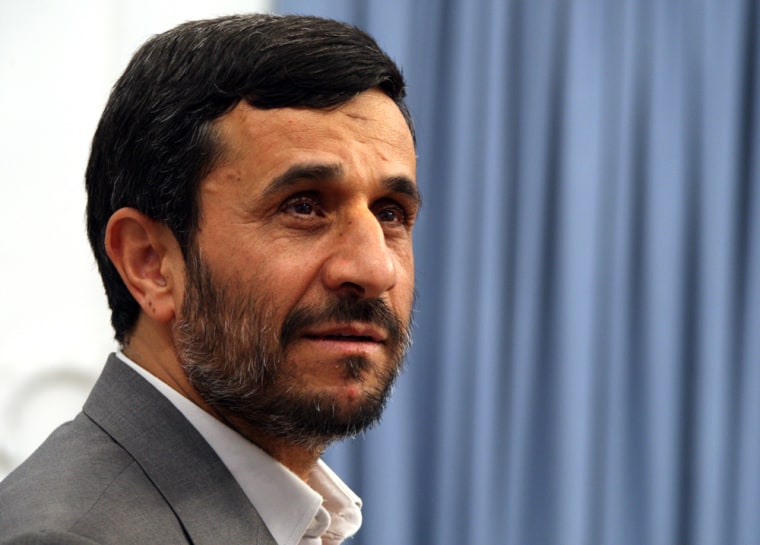Iran's hard-line president said Monday he would welcome direct talks with the U.S. if both parties are on equal footing, adding such talks could happen "in the near future."
President Mahmoud Ahmadinejad did not say whether any definite plans for such bilateral talks were under way.
"We will hold talks with the United States if they come to us on equal footing," Ahmadinejad said in a live speech on state TV.
Ahmadinejad also said he will attend the next U.N. General Assembly in New York in September in order to defend Iran's rights and propose changes to what he called the "unjust" Western system of administering international organizations. Ahmadinejad has attended every annual U.N. General Assembly meeting since he was elected in 2005.
Washington has no diplomatic ties with Iran because it regards the country as a state sponsor of terror. But recognizing its influence on Iraqi stability, officials last year opened limited discussions with Iranian officials focused only on Iraq, where the U.S. accuses Tehran of arming Shiite militias.
The U.S. has said it will not talk with Iran about its disputed nuclear program unless Tehran agrees first to halt uranium enrichment — a process that can be used to generate electricity, or make a nuclear bomb.
"Equal footing means that when two people want to talk, both have to be on equal terms. Dialogue doesn't make any sense if one side stands in a higher position and the other in a lower position," Ahmadinejad said.
'Wolf and sheep'
For years, Iran has vehemently opposed any direct talks with Washington, though it went to the limited, trilateral discussions with the U.S. and Iraq recently.
The father of Iran's 1979 Islamic revolution, Ayatollah Ruhollah Khomeini, likened any relationship between Washington and Tehran as that of a "wolf and sheep."
But Iran's current top leader, Ayatollah Ali Khamenei — who repeatedly rejected such talks in the past — has softened his tone in recent months.
In January, Khamenei said Iran's relationship with the United States might not be severed forever. He said he would be the first to support resuming diplomatic ties with Washington, but that doing so now would be "harmful" to Iran's interests.
There is no indication, however, that Washington would be open to direct talks. Tensions are running high between Tehran and the West over Iran's nuclear ambitions.
Ahmadinejad told state TV Monday he will not accept any conditions on the disputed nuclear program during talks with European Union officials this weekend. Major world powers have offered Iran a package of incentives in exchange for a halt to uranium enrichment.
Ahmadinejad said he rejects that condition. He says Saturday's talks will focus on "common" points instead. Iran's top nuclear negotiator, Saeed Jalili, and EU foreign policy chief Javier Solana are scheduled to meet in Geneva on July 19.
U.S.-Iran diplomacy relies on third parties
The United States cut diplomatic ties with Iran shortly after the 1979 Islamic Revolution, when militant students seized the U.S. Embassy in Tehran and published sensitive documents they found inside documenting American intelligence-gathering in the country.
The embassy, labeled by Iran as a "den of spies," is occasionally opened to the public as a museum documenting American misadventures in Iran and the Middle East.
The Swiss Embassy in Tehran looks after U.S. interests in Iran, while the Iranians have an interest section in Pakistan's embassy in Washington.
Last month, the Bush administration said it was considering setting up a diplomatic outpost in Iran in what would mark a dramatic U.S. return to the country nearly 30 years after the two nations severed relations.
"They haven't demanded it (formally) yet. But if they do ... we will study it with a positive view," Ahmadinejad said Monday.
